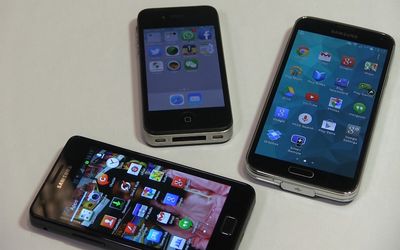A 30-PERSON startup in an artsy corner of Johannesburg’s gritty core is making it easier for millions of Africans to send and receive money across borders by using their phones.
Founded in 2009, MFS Africa has pioneered a mobile payment platform embraced by the continent’s biggest telecommunications operators, which count about 500-million customers combined.
Mobile phones are emerging as an essential payment device for Africans who increasingly trek across the continent and beyond seeking work. As they earn more money, they are looking for ways to move their cash quickly and easily.
The World Bank estimates that remittances to sub-Saharan Africa — or money foreign workers send home — increased 2.2% to $32.9bn in 2014 from a year earlier. That is about twice the average growth rate of the two previous years, and the World Bank expects them to grow an average of 2.7% between 2015 and 2017.
MFS Africa’s payment system doesn’t require high-end smartphones, in a continent where no-frills feature phones are still prevalent. All users need is to set up a mobile payment account with their operator — MFS Africa’s partners include MTN, subsidiaries of London-based Vodafone, Indian telecommunications company Bharti Airtel and many others.
They can transfer money to the mobile account of any other customers of these operators who are signed up to the system by texting the equivalent of a money order straight to their phone numbers, and confirming the transaction with a PIN.
Africa also enables transfers from brick-and-mortar money-transfer operators in Europe to mobile phones in Africa.
MFS Africa connects 55-million people in 17 African countries, up from 20-million a year ago. By the middle of next year, the company expects to have 100-million subscribers connected on the continent. Of those subscribers, about 15% are active users, defined as making roughly two transactions a month.
The company pockets around 30 cents a transaction; the average transaction is about $80. Many of them require a foreign-exchange conversion, and some mobile operators apply a foreign-exchange spread that MFS Africa sometimes gets a share of. The company expects to be profitable next year.
MFS Africa leads a pack of companies scrambling to help migrant workers across the continent send money home, transfers that are easier and cheaper thanks to technological innovations like mobile payments, according to the Groupe Speciale Mobile Association, which represents mobile operators world-wide.
Nicolas Vonthron, GSMA’s senior manager for mobile money, said MFS Africa’s closest competitor is global payment hub HomeSend, a joint venture between MasterCard, Bics, a wholesale communications service provider, and mobile financial services provider eServGlobal. "(MFS Africa) may be not as robust, but they’re probably also more agile," Mr. Vonthron said.
MFS Africa’s success is also accelerating South Africa’s emergence as a hub for mobile payment innovation across the continent. In 2011, Visa bought Cape Town-based mobile financial services provider Fundamo to expand the payment services it offers in developing markets like Rwanda.
MTN signed a deal with Vodafone this year to connect their mobile money operations in several East and Central African companies — an agreement facilitated by MFS Africa.
Sub-Saharan Africa accounted for more than half of the 255 live mobile money services across the globe in 2014, with monthly mobile money transactions in the region topping $10bn in late 2014, according to GSMA.MFS founder and CE Dare Okoudjou, who made his name almost a decade ago by developing MTN’s mobile payment strategy and implementing it across Africa and the Middle East.
He says the group is poised to grow rapidly.
"There is an insane amount of money that goes into paying money," said Mr Okoudjou, himself a migrant worker who was born in Benin.
The cost of sending remittances to sub-Saharan Africa is 12% of the amount transferred, well above the global average of 8%, according to the World Bank.
Serigne Dioum, MTN’s head of mobile financial services, says mobile-to-mobile partnerships enabled by MFS Africa’s hub will cut fees for cross-border transfers to 3% or less of a transaction’s value. Mr Dioum said MTN had already achieved that fee level in a pilot partnership last year with Airtel Burkina Faso in that country and neighbouring Ivory Coast, where MTN dominates.
Mobile operators and MFS Africa hope lower fees will increase the number and volume of transfers that subscribers make.
MFS Africa’s big break came with its contract with MTN. After that deal, MFS Africa signed up French telecom giant Orange SA.
"We had the advantage of being African and speaking French," Mr. Okoudjou said. Airtel came next, and then "Vodafone almost came by themselves.
"Whenever we got the chance we made sure we didn’t screw it (up)," he said.
The company continues to look for new ways to apply their technology.
MFS Africa’s payment platform, which requires all users to confirm transactions with a pin, "could be used for voting across sub-Saharan Africa", Mr Okoudjou said. "We got a lot of things to work on."
More Africa news from The Wall Street Journal
More news from The Wall Street Journal
Premium access to WSJ.com: $1 a week for 12 weeks
A 30-PERSON startup in an artsy corner of Johannesburg’s gritty core is making it easier for millions of Africans to send and receive money across borders by using their phones.
Founded in 2009, MFS Africa has pioneered a mobile payment platform embraced by the continent’s biggest telecommunications operators, which count about 500-million customers combined.
Mobile phones are emerging as an essential payment device for Africans who increasingly trek across the continent and beyond seeking work. As they earn more money, they are looking for ways to move their cash quickly and easily.
The World Bank estimates that remittances to sub-Saharan Africa — or money foreign workers send home — increased 2.2% to $32.9bn in 2014 from a year earlier. That is about twice the average growth rate of the two previous years, and the World Bank expects them to grow an average of 2.7% between 2015 and 2017.
MFS Africa’s payment system doesn’t require high-end smartphones, in a continent where no-frills feature phones are still prevalent. All users need is to set up a mobile payment account with their operator — MFS Africa’s partners include MTN, subsidiaries of London-based Vodafone, Indian telecommunications company Bharti Airtel and many others.
They can transfer money to the mobile account of any other customers of these operators who are signed up to the system by texting the equivalent of a money order straight to their phone numbers, and confirming the transaction with a PIN.
Africa also enables transfers from brick-and-mortar money-transfer operators in Europe to mobile phones in Africa.
MFS Africa connects 55-million people in 17 African countries, up from 20-million a year ago. By the middle of next year, the company expects to have 100-million subscribers connected on the continent. Of those subscribers, about 15% are active users, defined as making roughly two transactions a month.
The company pockets around 30 cents a transaction; the average transaction is about $80. Many of them require a foreign-exchange conversion, and some mobile operators apply a foreign-exchange spread that MFS Africa sometimes gets a share of. The company expects to be profitable next year.
MFS Africa leads a pack of companies scrambling to help migrant workers across the continent send money home, transfers that are easier and cheaper thanks to technological innovations like mobile payments, according to the Groupe Speciale Mobile Association, which represents mobile operators world-wide.
Nicolas Vonthron, GSMA’s senior manager for mobile money, said MFS Africa’s closest competitor is global payment hub HomeSend, a joint venture between MasterCard, Bics, a wholesale communications service provider, and mobile financial services provider eServGlobal. "(MFS Africa) may be not as robust, but they’re probably also more agile," Mr. Vonthron said.
MFS Africa’s success is also accelerating South Africa’s emergence as a hub for mobile payment innovation across the continent. In 2011, Visa bought Cape Town-based mobile financial services provider Fundamo to expand the payment services it offers in developing markets like Rwanda.
MTN signed a deal with Vodafone this year to connect their mobile money operations in several East and Central African companies — an agreement facilitated by MFS Africa.
Sub-Saharan Africa accounted for more than half of the 255 live mobile money services across the globe in 2014, with monthly mobile money transactions in the region topping $10bn in late 2014, according to GSMA.MFS founder and CE Dare Okoudjou, who made his name almost a decade ago by developing MTN’s mobile payment strategy and implementing it across Africa and the Middle East.
He says the group is poised to grow rapidly.
"There is an insane amount of money that goes into paying money," said Mr Okoudjou, himself a migrant worker who was born in Benin.
The cost of sending remittances to sub-Saharan Africa is 12% of the amount transferred, well above the global average of 8%, according to the World Bank.
Serigne Dioum, MTN’s head of mobile financial services, says mobile-to-mobile partnerships enabled by MFS Africa’s hub will cut fees for cross-border transfers to 3% or less of a transaction’s value. Mr Dioum said MTN had already achieved that fee level in a pilot partnership last year with Airtel Burkina Faso in that country and neighbouring Ivory Coast, where MTN dominates.
Mobile operators and MFS Africa hope lower fees will increase the number and volume of transfers that subscribers make.
MFS Africa’s big break came with its contract with MTN. After that deal, MFS Africa signed up French telecom giant Orange SA.
"We had the advantage of being African and speaking French," Mr. Okoudjou said. Airtel came next, and then "Vodafone almost came by themselves.
"Whenever we got the chance we made sure we didn’t screw it (up)," he said.
The company continues to look for new ways to apply their technology.
MFS Africa’s payment platform, which requires all users to confirm transactions with a pin, "could be used for voting across sub-Saharan Africa", Mr Okoudjou said. "We got a lot of things to work on."
More Africa news from The Wall Street Journal
More news from The Wall Street Journal
Premium access to WSJ.com: $1 a week for 12 weeks





















Change: 1.37%
Change: 1.32%
Change: 2.91%
Change: 0.45%
Change: 3.09%
Data supplied by Profile Data
Change: 1.63%
Change: 0.83%
Change: 1.37%
Change: 0.00%
Change: 0.69%
Data supplied by Profile Data
Change: -2.04%
Change: -1.88%
Change: -1.66%
Change: -1.94%
Change: -1.37%
Data supplied by Profile Data
Change: -1.25%
Change: 0.00%
Change: -0.85%
Change: -1.74%
Change: 2.92%
Data supplied by Profile Data